Safia stood square shouldered at the front of a high-ceilinged room. She looked out into the audience, a group of close to 40 women staring back, and munching baklava, spice-dusted flatbread, and syrupy basbousa. Her cheeks were framed by a blue hijab, a wide smile almost reaching each corner.
I’m funny, friendly, and social, she began.
I like to run and drive
I come to English class to learn
I need to get a job and go to college.
Thursday, Safia (pictured in the slideshow above) was one of several refugee women and volunteers to kick off Mother’s Day weekend with Integrated Refugee and Immigrant Services (IRIS) at Church of the Redeemer in East Rock. The celebration came as part of IRIS’ Mother and Child English Program, in which refugee moms learn English while their kids do a free preschool readiness program two floors below.
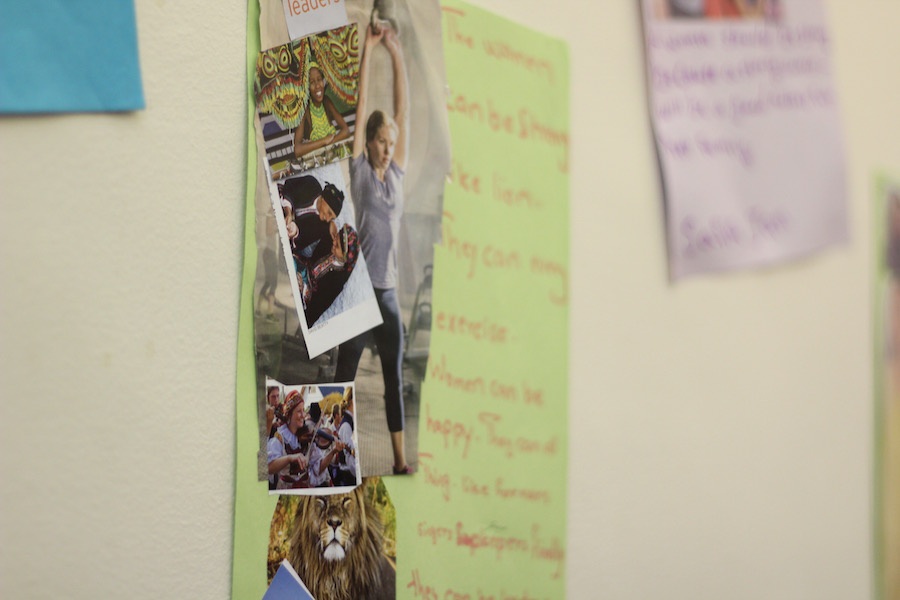
The program began in August of last year, after staff at IRIS identified a new barrier to access and acculturation: refugee women who were housebound, because their kids were too young to be in school. Some had degrees from institutions of higher education; others had received no formal schooling.
Some of them were coming in via the Afghan Special Immigrant Visa (SIV), for which the Federal Government identifies and invites families who have been working with U.S. Troops, and are at higher risk of violence from extremist organizations like the Taliban. The program also provides transportation for women who aren’t yet familiar with the city’s public transportation options.
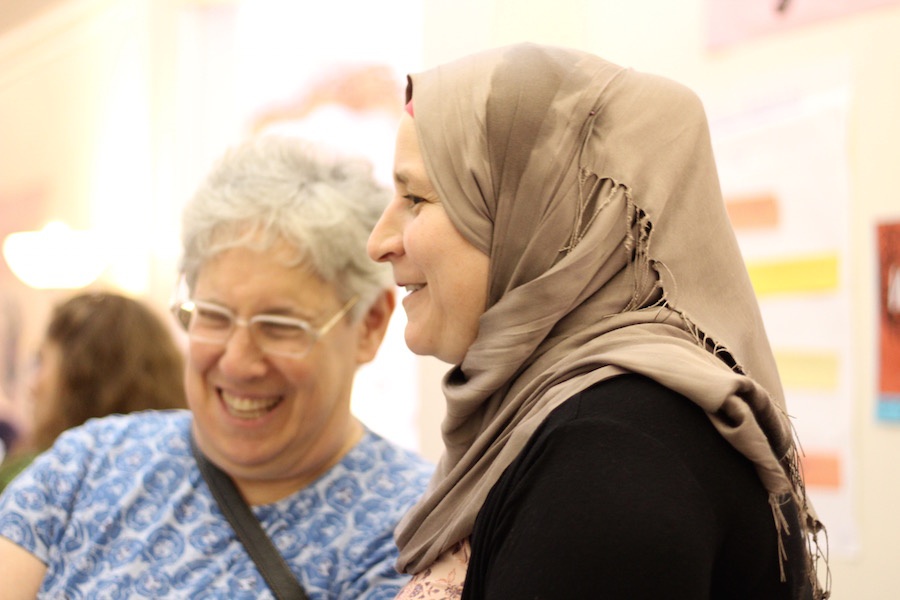
“She’s strong!” Yousef said of Oprah Winfrey. “She knows where she’s going. If I want a good future, I have to travel, I have to study.” Lucy Gellman Photos.
Despite a massive slowdown in the number of refugees legally allowed to enter the United States under President Donald Trump, there remains a waitlist for the class.
“The unique program design of IRIS’ Mother & Child English Program helps the participants overcome several barriers to learning English,” read a flyer that organizer and class manager Jen Fitzgerald distributed at the beginning of the event. “It provides childcare to women to focus on their learning.”
That learning has included word and photo collages, time-telling exercises, and personal poetry that brought the hallway to life Thursday. On one end, Abir Yousef stood by three large sheets of paper with photo clippings, as bios of Maria Bashir, Malala Yousafzai, and Oprah Winfrey winked out from the wall.
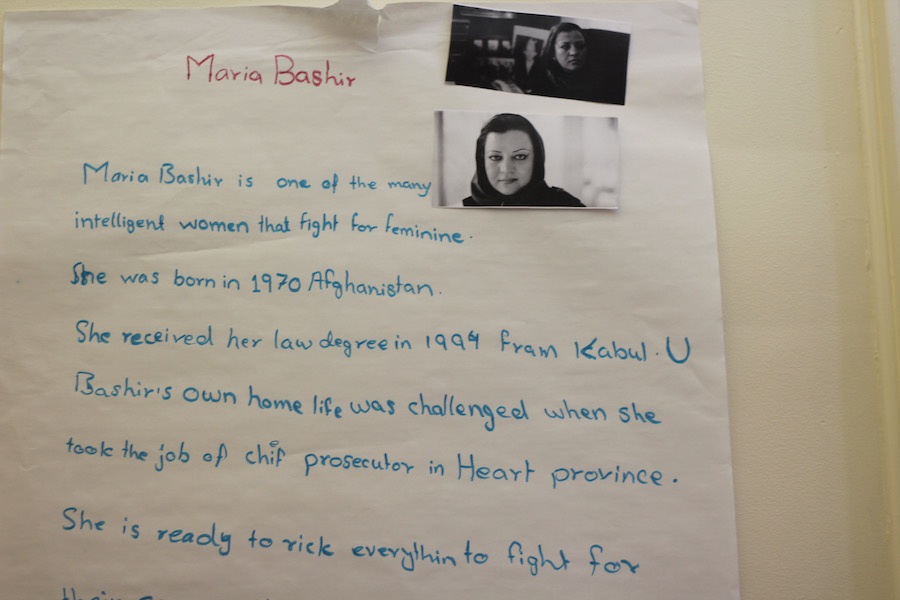
A mother of seven, Yousef is a refugee from Syria (read about her daughter Noor here) who studied sociology at the University of Damascus. As she learns English, she said she is interested in going back to college, and taking classes that will allow her to find work closer to her original studies. Looking over the three women, she zeroed in on the profile of Oprah, noting her rise from poverty in Mississippi to booming talk show host.
“She’s strong!” she said. “She knows where she’s going. If I want a good future, I have to travel, I have to study.”
“She’s like me,” she added. “She changed everything for her life.”
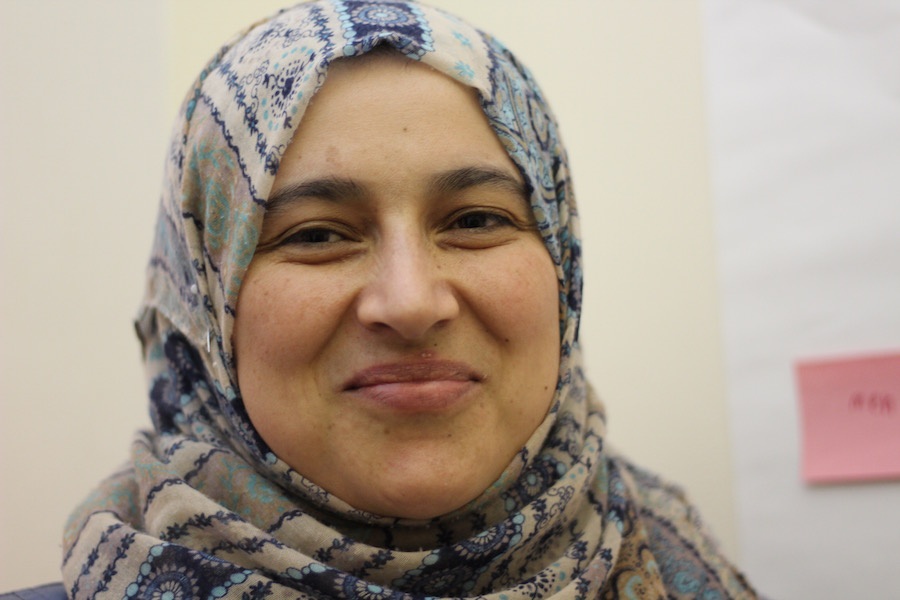
Hamda Alhraaki: Women and men can have any job.
Across from the first display, a second one busted gender stereotypes, sprawling sentences written on images of women weightlifting, stretching, playing instruments and leading animals. Under thick, black letters that read “Shattering Stereotypes,” Syrian refugee Hamda Alhraaki read off a series of sentences she and classmates had written on strips of yellow, orange and pink construction paper.
Men and women can be leaders.
Women and men can drive.
Men and women together help children.
Women and men can have any job.
Women and men can be doctors.
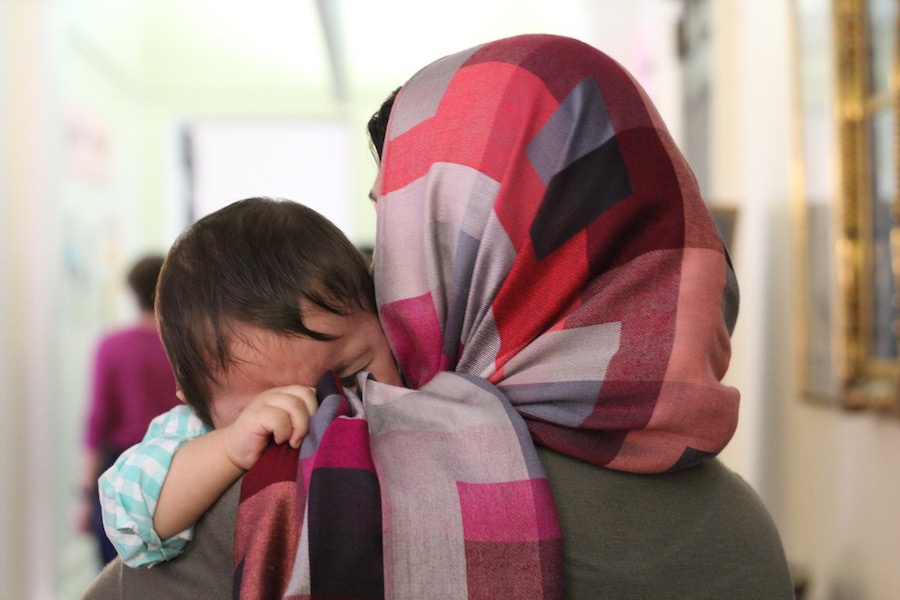
Zarghona Sadat: “We see a lot of violence against women in our country,” She asked that her face not be photographed.
She was joined by her classmate Zarghona Sadat, a mother of five who graduated from Kabul Medical University before coming to the U.S. as an Afghan refugee. She said she now wants to go back to school and be a dentist in the New Haven. Before she goes back to school, she said, she wants to improve her English in the classes, while her youngest son gets childcare downstairs.
For a moment, her eyes coasted over the work she had helped make: photo and magazine colleges based on the Women’s March on Washington, a woman in hijab leading a camel forward by the bridle, a female doctor. Then Sadat gestured to a micro-exhibition down the hall, dedicated to sexual harassment and assault. Walking the length of the hallway with her young son, she pointed out images that the class had printed out, and written reflections under.
In one that she worked on, the photograph is a split screen image of two women, both doe-eyed and looking out to something beyond the frame, and beyond our faces. In the first, she has a cut over her lip, deep and crusted with red like a stitch that hasn’t healed the right way. In the her eyes are surrounded by bright, splotchy bruises and still-red scabs, the marks of repeated battery.
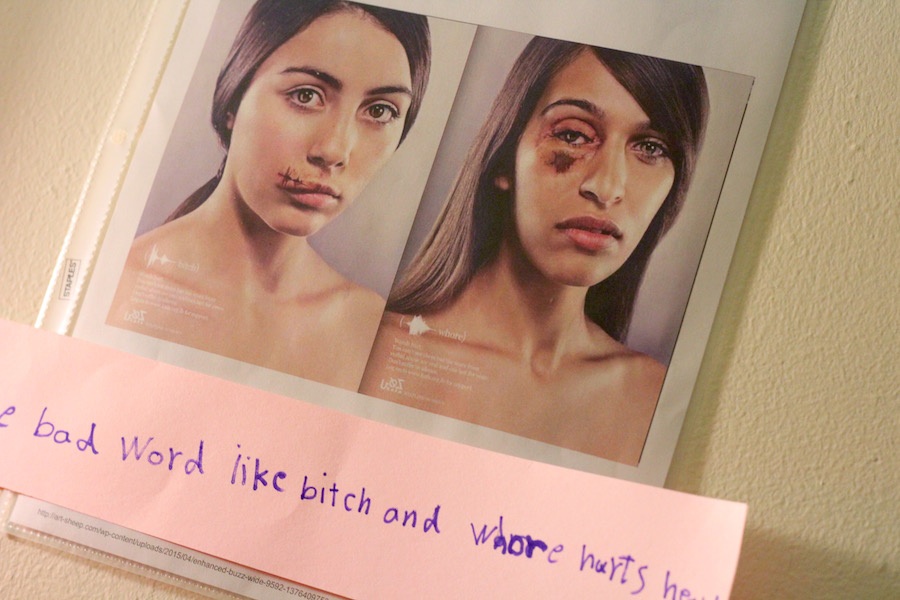
“We see a lot of violence against women in our country,” Sadat said, adding that she was referring to Afghanistan. “We want to stop the violence against the people.”
Bad words like bitch and whore hurts heart, read the caption from Sadat at the bottom.
In another, a woman locks eyes with her viewer, looking directly ahead of her. We can’t see the rest of her face: she is fully veiled in black, except for her eyes and a sliver where the bridge of her nose shows through. Beneath each eye, deep blue, green and purple bruises appear. “Some things can’t be covered,” a caption reads.
The image is an advertisement from 2013, created in response to domestic violence and abuse in Saudi Arabia by the artist Memac Ogilvy for the King Khalid Foundation. But the words that now surround it are by Safia and Yousef, who joined their classmates in working on the pieces.
We must help her this is human, reads a pink piece of construction paper. This picture is very painful for me/Women always have the right as women. We must defend ourselves, it continues in yellow at the bottom.
“We see a lot of violence against women in our country,” Sadat said, adding that she was referring to Afghanistan. “We want to stop the violence against the people.”